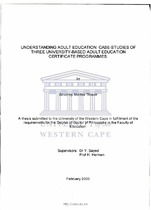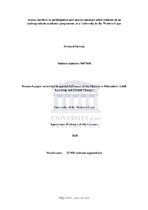Understanding adult education: Case-studies of three university-based adult education certificate programs.
Abstract
By the mid-1980s, the Nationalist Party had sought to salvage almost four decades of apartheid
policies that were based on white supremacy. In this regard, it engaged in dual strategies of
repression and reform. The state's strategies were challenged by organizations and movements
within civil society. In this regard, many community-based organizations mushroomed
both nationally and regionally. These organizations were coordinated by adult political activists
most of whom were perceived to lack the necessary skills to manage organizations more
effectively. In this conjuncture, the Adult Education Departments at five South African
universities developed certificate-level programs to address this gap. This study focuses on
three such programs, the Community Adult Education Programme, based at the University of
Cape Town, the Certificate for Educators of Adults at the University of the Western Cape, and
the Community Adult Educators Training Course based at the University of NatalPietermaritzburg.
This study investigates the social and political conditions that gave rise to the three certificate
programs. It also investigates the relationship between the external social and political
conditions and the internal curriculum practices of the certificates. This process analyses the
nature of the relationship and identifies shifts in the programs and the curriculum practices
between 1986 and 1996. The study uses a qualitative approach and draws on elements of critical
theory and social constructionism to understand the data gleaned from interviews and
documents.
This study argues that all three certificate programs have directly been tied into the sociopolitical context in South Africa between 1986 and 1996. In this decade the study argues, there
are three distinct political periods, namely repression/reform, negotiations, and fragile
democracy. It argues that distinct features from each period have shaped the certificates in
different ways. Along with the national political conditions as manifest at the level of the state,
the private sector, and civil society, there are local and institutional dynamics that contribute to the
different forms assumed by these certificates. The study further argues that the external social -
political conditions from each period have demarcated and fixed the boundaries for the
certificates as a social practice. In this process, the curriculum practices for each period permitted
certain words and practices in preference to others. Consequently, it argues that the external and
internal social and political dimensions together construct the certificates as a discourse.
This study is based on a belief that the role of a certified practitioner is to creatively locate the
day-to-day practices within different theoretical frameworks to advance studies into sites
of adult education practices. This study represents a step in such a direction.
Collections
Related items
Showing items related by title, author, creator and subject.
-
Investigating barriers to participation in adult learning among adult learners at a university in Southern Africa: A Chain-of-Response Model
Felix, Agnes (University of the Western Cape, 2020)This study was prompted by the increase in the numbers of adult learners who registered for a Diploma in Secondary Education offered by a tertiary institution (university). The diploma is a one-year programme, offered over ... -
Understanding adult education: Case-studies of three University-based adult education certificate programmes.
Thaver, Beverley Martha (University of the Western Cape, 2000)By the mid 1980s the Nationalist Party had sought to salvage almost four decades of apartheid policies that were based on white supremacy. In this regard it engaged in dual strategies of repression and reform. The state's ... -
Access, barriers to participation and success amongst adult students in an undergraduate academic programme at a University in the Western Cape
Stevens, Howard (University of Western Cape, 2020)The choice of topic for the research paper was influenced by my experiences of attending university as an adult student and contemporary policy developments. In its White Paper for Post School Education (2013) the Department ...




